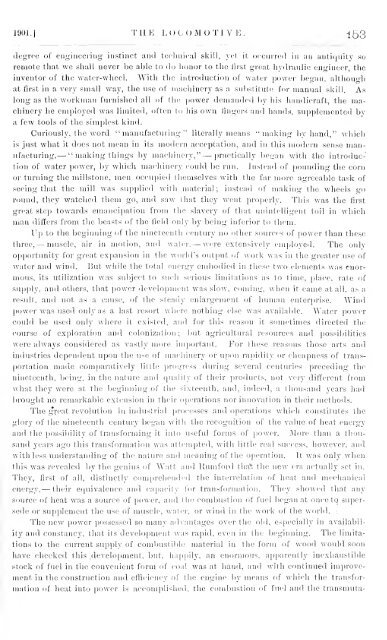The Locomotive - Lighthouse Survival Blog
The Locomotive - Lighthouse Survival Blog
The Locomotive - Lighthouse Survival Blog
Create successful ePaper yourself
Turn your PDF publications into a flip-book with our unique Google optimized e-Paper software.
1901.<br />
J<br />
THE LOCOMOTIVE. -153<br />
degree of engineering instinct and technical skill, yet it occurred in an antiquity so<br />
remote that we shall never be able to do honor to the first great hydraulic engineer, the<br />
inventor of the water-wheel. With the introduction of water power began, although<br />
at first in a very small way, the use of machinery as a substitute for manual skill. As<br />
long as the workman furnished all of the power demanded by his handicraft, the ma-<br />
chinery he employed was limited, often to his own fingers and hands, supplemented by<br />
a few tools of the simplest kind.<br />
Curiously, the word "manufacturing" literally means " making by hand," which<br />
is just what it does not mean in its modern acceptation, and in this modern sense manufacturing,—<br />
" making things by machinery," — practically began with the introduc-<br />
tion of water power, by which machinery could be run. Instead of pounding the corn<br />
or turning the millstone, men occupied themselves with the far more agreeable task of<br />
seeing that the mill was supplied with material; instead of making the wheels go<br />
round, they watched them go, and saw that they went properly. This was the first<br />
great step towards emancipation from the slavery of that unintelligent toil in which<br />
man differs from the beasts of the field only by being inferior to them.<br />
Up to the beginning of the nineteenth century no other sources of power than these<br />
three,— muscle, air in motion, and water.— were extensively employed. <strong>The</strong> only<br />
opportunity for great expansion in the world's output of work was in the greater use of<br />
water and wind. But while the total energy embodied in these two elements was enor-<br />
mous, its utilization was subject to such serious limitations as to time, place, rate of<br />
supply, and others, that power development was slow, coming, when it came at all, as a<br />
result, and not as a cause, of the steady enlargement of human enterprise. Wind<br />
power was used only as a last, resort where nothing else was available. Water power<br />
could be used only where it existed, and for this reason it sometimes directed the<br />
course of exploration and colonization ; but agricultural resources and possibilities<br />
were always considered as vastly more important. For these reasons those arts and<br />
industries dependent upon the use of machinery or upon rapidity or cheapness of trans-<br />
portation made comparatively little progress during several centuries preceding the<br />
nineteenth, being, in the nature and quality of their products, not very different from<br />
what they were at the beginning of the sixteenth, and, indeed, a thousand years had<br />
brought no remarkable extension in their operations nor innovation in their methods.<br />
<strong>The</strong> g'reat revolution in industrial processes and operations which constitutes the<br />
glory of the nineteenth century began with the recognition of the value of heat energy<br />
and the possibility of transforming it into useful forms of power. More than a thou-<br />
sand years ago this transformation was attempted, with little real success, however, and<br />
with less understanding of the nature and meaning of the operation. It was only when<br />
this was revealed by the genius of Watt and Rumford that the new era actually set in.<br />
<strong>The</strong>y, first of all, distinctly comprehended the interrelation of heat and mechanical<br />
energy,— their equivalence and capacity for transformation. <strong>The</strong>y showed that any<br />
source of heat was a source of power, and the combustion of fuel began at once tq super-<br />
sede or supplement the use of muscle, water, or wind in the work of the world. .<br />
<strong>The</strong> new power possessed so many advantages over the old, especially in availabil-<br />
ity and constancy, that its development was rapid, even in the beginning. <strong>The</strong> limita-<br />
tions to the current supply of combustible material in the form of wood would soon<br />
have checked this development, but, happily, an enormous, apparently inexhaustible<br />
stock of fuel in the convenient form of coal was at hand, and with continued improvement<br />
in the construction and efficiency of the engine by means of which the transfor-<br />
mation of heat into power is accomplished, the combustion of fuel and the transmuta-
















